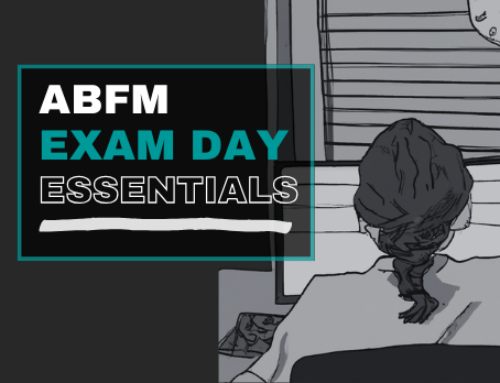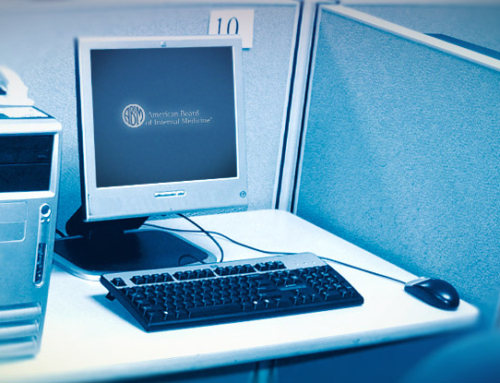As you juggle the demands of Internal Medicine residency, studying for your Internal Medicine Certification exam may drop to the bottom of your to-do list, despite its importance. Many third-year residents wait to study only to find themselves overwhelmed when the high-stakes ABIM exam is looming just around the corner. Your future self will thank you if you take a more pragmatic approach: Regard every day of your residency as a study tool!
Why? Because our brains acquire and retain knowledge best under certain conditions: when we need the knowledge in the moment and when the new information has context. Read on to understand why and how to make it a daily habit to learn in the context of your patients throughout your residency. You’ll maximize your ability to provide excellent patient care and be in good shape when exam day rolls around.
4 Reasons Why You Should Study for the ABIM Exam in the Context of Your Patients
Relevance and Proximity Lead to Deeper Understanding
 Relating new learning to recent real-world clinical situations will help you form connections between what you already know and the latest information. This will lead to a deeper understanding that is foundational to clinical reasoning skills, which in turn are key to successfully working through the case-based questions you’ll see on the ABIM certification exam.
Relating new learning to recent real-world clinical situations will help you form connections between what you already know and the latest information. This will lead to a deeper understanding that is foundational to clinical reasoning skills, which in turn are key to successfully working through the case-based questions you’ll see on the ABIM certification exam.
“This means that when you are in the ICU and you have an intubated patient, read about how to help a patient with ARDS or best practices to prevent ventilator-associated pneumonia. In a general medicine rotation, when you are caring for a patient with Clostridium difficile, read about the best treatment options and the latest studies to prevent a recurrence,” says Chris Smith, MD, director of the internal medicine residency program at Beth Israel Deaconess Medical Center and deputy reviewer of NEJM Knowledge+ Internal Medicine Board Review. Seek out relevant question banks, review articles, clinical studies, guidelines, case reports, and learning modules, he advises. Any materials in sync with the day’s cases will help you build a scaffolding of knowledge.Activating Prior Knowledge and Making Immediate Connections Increases Retention
When you relate new information to something you already know or have experienced, you activate prior knowledge and then your mind connects the existing knowledge and the new information. This will help you to organize and remember it more effectively because it is anchored to something or someone familiar, such as a recent patient.
 Consider this routine interaction: A 45-year-old patient asks when he should begin colon cancer screening. It’s on his mind because his father was diagnosed with it at 42. You recall that screening should start at age 45-50 in average-risk populations. You then download the current guidelines from the U.S. Preventive Services Task Force and learn that patients with a parent, sibling, or child who has been diagnosed with colorectal cancer should begin screening 10 years before the age that the youngest first-degree relative was diagnosed, whenever possible.
Consider this routine interaction: A 45-year-old patient asks when he should begin colon cancer screening. It’s on his mind because his father was diagnosed with it at 42. You recall that screening should start at age 45-50 in average-risk populations. You then download the current guidelines from the U.S. Preventive Services Task Force and learn that patients with a parent, sibling, or child who has been diagnosed with colorectal cancer should begin screening 10 years before the age that the youngest first-degree relative was diagnosed, whenever possible.
At the moment, the new information has immediate relevance and context for you. You associate it with your patient and it sticks with you. You are more likely to remember it within the context of an actual patient than if you were to study the guidelines during a cram session a few months later.You’ll Improve Your Ability to Apply New Knowledge and Make Inferences to Novel Patient Scenarios
Learning within the context of a patient you just treated will help you to apply your patient experience plus your new knowledge and skills to future clinical problems and situations. So, after counseling your patient on colon cancer screenings, reread the guidelines to understand how they apply to the broader population. With the C. difficile patient, think about how to treat the patient now and expand your learning by asking yourself (and reading up on) what you would do if this recurred.
By making this reinforcement and enhancement of learning a daily habit, you will consolidate and build knowledge. Not only will you memorize facts so you can recall them during the exam, but you will also actively learn in context, expanding the depth and breadth of your understanding of the topic. Learning this way aids in the complex decision-making that contributes to good patient care. Moreover, most of the questions on the ABIM certification exam mirror this multi-step decision-making process.Your Patients Will Increase Your Motivation
Contextual learning can increase your motivation to learn because it makes the information more meaningful. After all, what could be more motivating than seeing how your medical knowledge translates to saving and improving the lives of your patients?
An ideal thought process after every patient encounter is to ask yourself, “What is the main clinical point of what I just did or observed?” Then, take the next mental step of putting that patient scenario in context with the disease state you are addressing. The final, critical step is one you should take shortly afterward: Read relevant content and answer Internal Medicine questions about the topic.
 Nightly Reading Consolidates Knowledge for the Internal Medicine Certification Exam
Nightly Reading Consolidates Knowledge for the Internal Medicine Certification Exam
Experienced medical educators offer third-year residents simple advice: Read at the end of every workday. Turn to relevant literature while a patient interaction is fresh in your mind. You may not have the time or the specific need to do this in the bedside moment. But later in the day, while the cases are still fresh in your mind, seek out information related to the clinical scenarios you encountered.
Even confident, successful test takers — especially those who tend to put off “studying” — will find themselves well served by daily reading, reflection, and answering Internal Medicine Questions.
Use Your In-Training Exam as a Guide for the Internal Medicine Certification Exam
The Internal Medicine in-training exam (IM-ITE) given by most residency programs during year 2 to gauge training progress can also serve as a guide and an opportunity. Residencies use the exams to evaluate their programs and identify areas for program improvement. Because the IM-ITE is mapped to the blueprint for the ABIM internal medicine certification exam, your individual results may provide insight into your areas of strength as well as those that need attention.
If you did poorly on your in-service exam, don’t panic. But do take the time to assess what went wrong and how you can correct it. Ask yourself:
- Was that one day an anomaly? Were you tired or distracted?
- Have your more recent rotations bolstered your knowledge in weak areas?
Try taking another in-training exam (which may be allowed at the discretion of your program director) or an Internal Medicine practice exam to get a realistic view of your strengths and weaknesses. You may be surprised by what you have learned during the past year of patient care.
When faced with the internal medicine certification exam, some new doctors may feel overwhelmed due to the extensive reading material and numerous studying options available. Daily, targeted reading in tandem with patient care will help. But an ABIM study plan also is essential.
Take a Strategic Approach to Studying for Your First ABIM Certification Exam
Whether you are a crammer, planner, or episodic studier, you will need a study strategy for the months ahead. Even if you’ve always gotten by with cramming, it’s worth considering whether this is a realistic strategy given the complexity and breadth of the internal medicine certification exam. Consider how the ABIM certification exam may differ from other tests you’ve taken. While matching your study style with specific tools is helpful, nearly every strategy will share these common steps:
- Take a practice test to assess your areas of strength and weakness.
- Become familiar with the ABIM blueprint for the internal medicine certification exam.
- Focus your review efforts on topics that make up a significant portion of the ABIM exam and are also areas where you need to improve.
- Assess which study tools and strategies have worked for you previously and what additional options are available for the ABIM certification exam.
- Make a plan for how you will study and review several months before the exam. Then, stick to it.
Throughout this process, it is important to remember that how well you perform on a one-day, multiple-choice test is not the ultimate statement of whether you are a good or a bad doctor. “I know people who have great mastery of knowledge, who have excellent bedside manner, and you’d want them for your doctor — but they struggle with exams,” says Dr. Smith.
Even so, demonstrating mastery of knowledge in this multiple-choice format is still an essential step in your career. A good review plan, study aids that work for you, and the determination to stick with it for the next several months will go far. As you look ahead to the exam, don’t overlook the opportunities to build and reinforce knowledge in your daily work. Everyday and every patient interaction — bolstered by tackling relevant reading and Internal Medicine questions — will prepare you for your ABIM certification exam.
How NEJM Knowledge+ Internal Medicine Helps
NEJM Knowledge+ Internal Medicine Board Review offers relevant and digestible explanations on every case-based question. It includes links to high-quality source materials that allow you to expand your knowledge of the clinical scenarios you experience with your patients. You can work through each specialty module as you encounter relevant topics in your rotations. For example, if you are on an endocrinology rotation, you can skip to that specialty module in NEJM Knowledge+ Internal Medicine. The system also adapts to your unique learning needs by prioritizing questions based on your performance, saving you hours.








